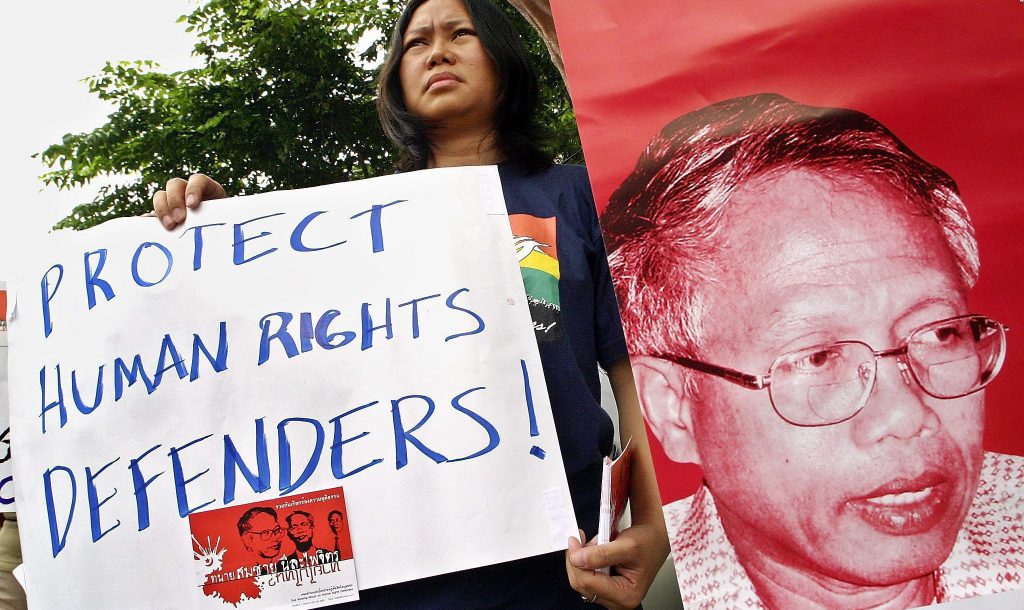Two women’s ongoing struggle to find answers about their missing husbands highlights the triumphs and trials for those searching for truth, justice and the disappeared across the region, writes Ng Yap Hwa.
In Thailand’s mountainous south, adjacent to Kaeng Krachan National Park, lives Pinnapa “Mueno” Prueksapan — a mother turned activist who since the disappearance of her husband two years ago has been campaigning for justice.
Dressed in the traditional clothes typical to ethnic Karen, Mueno explains to me that her husband Porlajee “Billy” Rakchongchaeron, a human rights defender, was arrested by national park officials on 17 April 2014 and has been missing ever since. The national park officials accused Billy of illegally possessing wild bee honeycomb and claim they released him after a warning.
Before he went missing, Billy had been assisting Bangkloybon villagers to prepare for an upcoming legal hearing relating to the burning of 20 ethnic Karen houses and rice barns by the national park officials in July 2011. Billy’s mysterious disappearance thwarted the villagers’ effort to reclaim their land rights and to seek reparation.
Mueno has been relentless in holding the government accountable for what see claims is the enforced disappearance of Billy, particularly the national park chief Chaiwat Limlikitaksor who had previously been in conflict with her husband. With the support of civil society organisations, she has lodged police reports, and filed lawsuits in the lowest court to the Supreme Court.
Unfortunately, the Supreme Court dismissed Mueno’s appeal on the ground that there was no substantial evidence, owing to the fact that witness statements were based on hearsay and circumstantial evidence. But, Mueno has not given up hope – she has filed another complaint with the Department of Special Investigation (DSI) to review her husband’s case.
Billy’s case has highlighted Thailand’s enforced disappearance issue in both the national and international arena, as well as motivated the Thai cabinet to table the Prevention and Suppression of Tortures and Enforced Disappearances Bill in parliament. But activists remain skeptical about the watered down bill will effect change – particular since it removed clauses on the participation of civil society. Billy is the 82nd case of enforced disappearance in Thailand since 1980 where the culture of impunity among enforcement agencies is rampant.
Another high profile enforced disappearance case in Thailand – that of human rights lawyer Somchai Neelapaijit – is a reminder Thailand’s human rights movement is a long-term struggle. In 2004, Somchai was defending individuals from southern Thailand who were accused of attacking an army camp. He sent a letter of complaint to police in relation to torture and forced confession of his clients. The next day he was abducted in suburb of Bangkok.
Somchai’s wife Angkhana Neelaphaijit has relentlessly fought for answers and justice through both Thailand’s judiciary and her activism. In 2006, she helped establish the Justice for Peace Foundation to raise public awareness of issues relating to justice, rule of law and human rights, as well as to strengthen the capacity of victims and their family members to fight for justice. The foundation believes that change can only happen through empowering people.
The two cases also share another important similarity – the search for answers is being driven by women. Despite tremendous obstacles, Mueno and Angkhana, have fought for justice and institutional reforms without hesitation. They are all struggling to maintain a livelihood, care for children and meet other family commitments, yet squeezing out their leisure time to join human rights campaigns. If their efforts are judged by years, they are destined to fail. But if their works are judged by a generation-long timeline, human rights defenders as historical actors will triumph.
Even if the tasks of institutional reform and the protection of human rights cannot be completed by their generation, their accumulated works may facilitate the success of human rights defenders in the future. It is akin to Sisyphus, who was condemned by the gods to ceaselessly push a rock to the mountain top; every little effort has contributed slowly to a change of state characteristics and will eventually lead to legal reform.
These women, like so many others pursuing similar cases indeed are the pillars of justice that hold up the pantheon of human rights and democracy in Southeast Asia.
Ng Yap Hwa, a postgraduate student at Institute of Human Rights and Peace Studies, Mahidol University, Thailand.
 Facebook
Facebook  Twitter
Twitter  Soundcloud
Soundcloud  Youtube
Youtube  Rss
Rss 